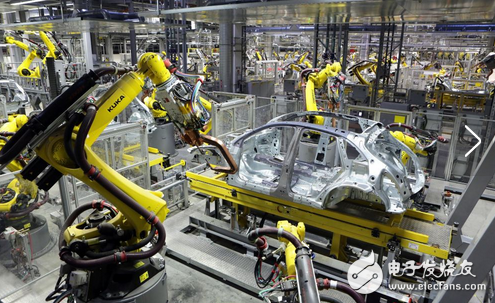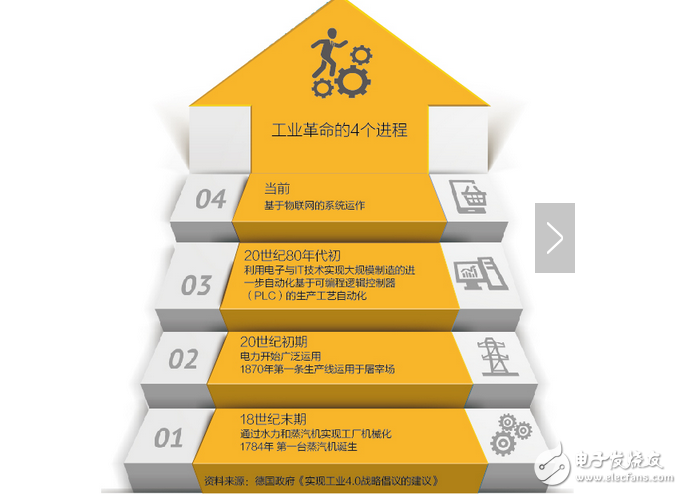German manufacturing is one of the most competitive manufacturing industries in the world and has a leading position in the global manufacturing equipment sector. Much of this stems from Germany's focus on the research and development of innovative industrial technology products and the management of complex industrial processes. Germany has a strong equipment and workshop manufacturing industry, has a high level of competence in the world of information technology, and has a very professional technology in embedded systems and automation engineering. These factors together have established Germany's leading position in the manufacturing engineering industry. . Through the implementation of the Industry 4.0 strategy, Germany will become a supplier and leading market for a new generation of industrial production technology (ie, information physics systems), which will enable Germany to once again enhance its global competitiveness while continuing to maintain the development of domestic manufacturing. In society, Germany's perfect democratic legal system and intellectual property protection are the solid backing for the healthy development of German manufacturing industry, and it is a real weapon to reduce social production costs and improve efficiency.
A key point of Industry 4.0 is “raw material (material)†= “informationâ€. Specifically, the raw materials purchased in the factory are “posted†with a label: this is the XX product produced for the A customer, and the raw material in the XX process. To be precise, the “raw materials†containing information are used in smart factories, and “raw materials (materials)†= “information†is realized. Manufacturing will eventually become a part of the information industry, so Industry 4.0 will be the last industrial revolution.
Business models are critical to manufacturing. So, in the era of Industry 4.0, what is the business model of the future manufacturing industry? It is mainly to solve customer problems. Therefore, in the future, manufacturing companies will not only sell hardware, but provide more added value by providing after-sales service and other follow-up services. This is soft manufacturing. The system with "information" function becomes the new core of hardware products, which means that personalized demand and small-volume custom manufacturing will become the trend. Entrepreneurs in the manufacturing industry should increase the added value of products as much as possible in the manufacturing process, expand more and richer services, propose better and better solutions, meet the individual needs of consumers, and soften manufacturing. + Personalized roads.
How terrible is German Industry 4.0?Germany does not follow the path of the US Internet, but strives to achieve overtaking in corners based on its own advantages in manufacturing R&D. I am afraid that Chinese companies should pay special attention when studying Industry 4.0.
Table tennis world champion Boer vs. KUKA robot arm
Robotic arm imitating person
Imagine a day when you suddenly want a car. You take out your mobile phone, click on the app, enter your customization requirements, and just wait for the factory to arrange production, assembly and distribution.
Such customized intelligent production may not be far away. In the era of Industry 4.0, every consumer can control production according to his own will. But this is far from the whole picture. At that time, the existence of the Internet of Things will further transform the way of life of human beings.
For example, your home refrigerator can automatically sense the lack of milk, automatically send milk information to the factory, the factory custom-made milk for your taste, and even your name. The milk will then be delivered to your home in time.
The above-mentioned sci-fi "Internet of Everything" scenario is an industry 4.0 that the German government and business community are trying to achieve.
Why is Germany pushing Industry 4.0, what is the driving force behind it? Can Chinese companies really learn? "First Financial Daily" reporter recently visited Germany, the main "source", trying to reveal the past and present of Industry 4.0.

German ambition
The Industrial 4.0 strategy was first proposed at the 2013 Hannover Messe. Since then, the concept of Industry 4.0 has gradually attracted attention.
The reason why it is called Industry 4.0 is mainly relative to the previous three industrial revolutions: Industry 1.0 refers to the first industrial revolution that began in the 18th century, and realized mechanical production instead of manual labor; the second industrial revolution began in the 20th century. At the beginning, mass production was realized by the production line; Industry 3.0 was familiar to modern people, referring to the automation of production after relying on electronic systems and information technology after the 1970s.
Over the past 20 years, the Internet revolution led by the United States has profoundly changed the way of life of human beings, and other countries have followed suit. Some analysts believe that in order to compete with the United States in the industrial 3.0 era, Germany is eager to stop the dominance of information technology in manufacturing, and then lead a new round of industrial revolution, becoming the maker of new game rules.
Germany has a different competitive advantage than the United States: manufacturing. Whether it is quality or technology, German manufacturing is synonymous with excellence around the world. About 70% of manufacturing products in Germany are exported to all parts of the world. It is precisely because of this that in the economic crisis of recent years, the German economy can maintain strong stability, in stark contrast with the United States and other European countries.
People from all walks of life in Germany are highly consistent in this view.
"Specifically to the software industry, Germany is not the strongest, and now the strongest is undoubtedly the United States." Esser, chairman of the German Saxony Silicon Valley, told the "First Financial Daily", but Germany also has its strengths. It is the combination of technology, equipment and software to form a whole. The Saxon Silicon Valley is an entrepreneurial base in Saxony, Germany, with a large number of technology startups.
"Compared with the United States, Germany is a little different. Germany has a strong manufacturing industry. It starts from another foundation." Han Peide, representative of the German Federal Foreign Trade and Investment Agency in China, told the "First Financial Daily" that Germany's current goal It is the transformation of traditional manufacturing into an electronic manufacturing industry and the addition of new services in the manufacturing industry, purely driven by manufacturing. "Our pillar industry, in my opinion, is manufacturing," he added.
In this context, combined with the traditional manufacturing advantages, Germany finally launched the Industry 4.0 strategy at the national level, and was endorsed by Chancellor Merkel. Henning Kagermann, the proponent of the concept of Industry 4.0 and the dean of the German Academy of Engineering, said that Industry 4.0 provided an opportunity for Germany to further strengthen its position as a manufacturing base, a supplier of production equipment and a supplier of IT business solutions.
In a sense, Industry 4.0 is Germany's outreach plan for its own characteristics. Instead of taking the path of the US Internet, they are trying to achieve a corner overtaking based on their own advantages in manufacturing R&D. I am afraid that Chinese companies should pay special attention when studying Industry 4.0.
During the few days of German visits, the reporter contacted a large number of German SMEs, which are the cornerstone of German manufacturing. They are all leaders in a certain manufacturing field, although the company is small, but it is world-renowned. The heads of each company are focusing on developing new products and opening up new markets. Few people take the initiative to mention listings and financing to reporters. Even for the injection of external funds, they are cautious because they do not affect the decision-making of enterprises.
Industry 4.0 with strong German characteristics is actually a huge project. According to the introduction of the German industrial giant Siemens official website, the core of Industry 4.0 is intelligent manufacturing, through the embedded processor, memory, sensors and communication modules, the equipment, products, raw materials, software are linked together, so that the products and different production Devices can interconnect and exchange commands.
In other words, the factory can optimize and control the production process on its own. According to the industry's further vision, in addition to the interconnection of products and machines, Industry 4.0 will realize the interconnection of factories, consumers, products, information and data in the future, and finally realize the interconnection of all things, thus reconstructing the production mode of the whole society. From the German manufacturing base, many conditions are already in place, and the lack of is how to achieve smart connections.
Kong Hanning told this reporter that when Germany defined Industry 4.0, it was mainly about two points: the first is to determine the logic of all things, and the second is to build a network-physical system that combines virtuality and reality.

This virtual and real-world interconnection is achieved through a "virtual network-Crystal-Physical System (CPS), which is the core of Industry 4.0. It connects the physical devices to the Internet, allowing physical devices to have intelligent functions such as computing, communication, control, remote coordination, and autonomy, and to connect resources, information, objects, and people to create Internet of Things and related services.
“This means that after a period of time, every item will be digitized. But if you change the virtual interface, it will also affect the entity.†Kong Hanning said, “So I think it’s not just bringing information technology to the factory, it’s The most basic, but to fully present the entire digital factory in the cloud."
Kong Hanning is one of Merkel's think tank members. At this year's CeBIT exhibition (Consumer Electronics, Information and Communication Expo) in Hannover, he released a new Industry 4.0 report.
In response to this, Merkel presented ten major events for Germany at the opening ceremony of the exhibition, including speeding up German broadband to 50M, speeding up the construction of free WiFi in public areas, and promoting the security of big data. Balance with policy, build German manufacturing as an advanced brand of digital security, and promote the development of transportation networking and automotive networking technologies.

Three hidden dangers
In the two years, the sudden explosion of the concept of Industry 4.0 has also caused certain concerns in the German industry.
Considering that this concept is still more than ideal, no one can predict the potential risks. However, in the eyes of the industry, there are at least three points worthy of attention, including data security, lack of standardization, and enthusiasm of SMEs.
The first is concerns about the control of big data behind smart manufacturing, including the fact that people must be trusted and that the data must be protected from hacking and espionage.
“When data is part of the story, information security is especially important.†Han Peide told this reporter that, first of all, the software industry is part of Industry 4.0, which requires a high level of security. Second, some companies are dedicated to To manage security issues, such as how to ensure data conversion security; and the German government's economic department has done some work to encourage the company to establish a correct division of labor.
"I don't know what it is like in China, but I know that some companies in Germany really value data security," said Han Peide.
A person who has lived in Germany for a long time also expressed concern about this. For example, milk customization, consumers will worry that their tastes, consumption habits, health and other data will be abused by enterprises and lose their basic privacy.
On the other hand, the lack of standardization of the connection system is a major difficulty in the implementation of Industry 4.0, because it will hinder the interconnection between different devices and systems, thus hindering the realization of interconnection.
"In my opinion, the problem is that there is only one solution, only one standard." Han Peide told this reporter, "But we all know that it is difficult to unify the ideas of all people in one standard. For example, everyone uses Microsoft. The product, but many people are not satisfied with it, so other products have been invented as another open option."
Merkel believes that Germany can become a promoter of the Industry 4.0 standard and implement these standards globally. However, as of now, there are still no publicly available information on the details of these standards. Countries such as the United States and Japan are also exploring similar standards.
In addition, at present, mainly large enterprises participate in the construction and use of the Industry 4.0 platform, which will be used for data exchange, device connection and so on. “We need to build several commercial platforms.†Kong Hanning said that Germany welcomes foreign companies to participate in the construction of these platforms.
“Industry 4.0 is still mainly suitable for large enterprises, such as automakers. Because the division of labor in the automotive industry is very detailed, it may be necessary to install sensors and controllers in certain processes to combine different programs through the network. For automakers, going to the stage of Industry 4.0 should be said to be a matter of course.†Leipzig Investment Promotion Agency official Micheal Schimansky told this reporter, “For large enterprises, Industry 4.0 is useless. There is nothing to discuss now, there is still a lot of room for discussion for SMEs."
Saxon Silicon Valley Chairman Essell also told this newspaper: "It depends on how high the degree of automation used for production depends on the size of the company. For companies with smaller production volumes, full automation does not make sense. ."
With more than 15+ yrs rich MFG experience, you can definitely trust in and cooperate with.
Provide you with the supply of personal protective equipment. to help you safely get back to your daily routine.
Our products include pulse Oximeter Finger, Forehead Thermometer, Automatic foam soap dispenser, etc.
Our strict quality control protocol thoroughly vets every aspect of production, storage, and shipments all the way way to our end customers.
protective equipment, ppe personal protective equipment, definition of personal protective equipment
TOPNOTCH INTERNATIONAL GROUP LIMITED , https://www.micbluetooth.com